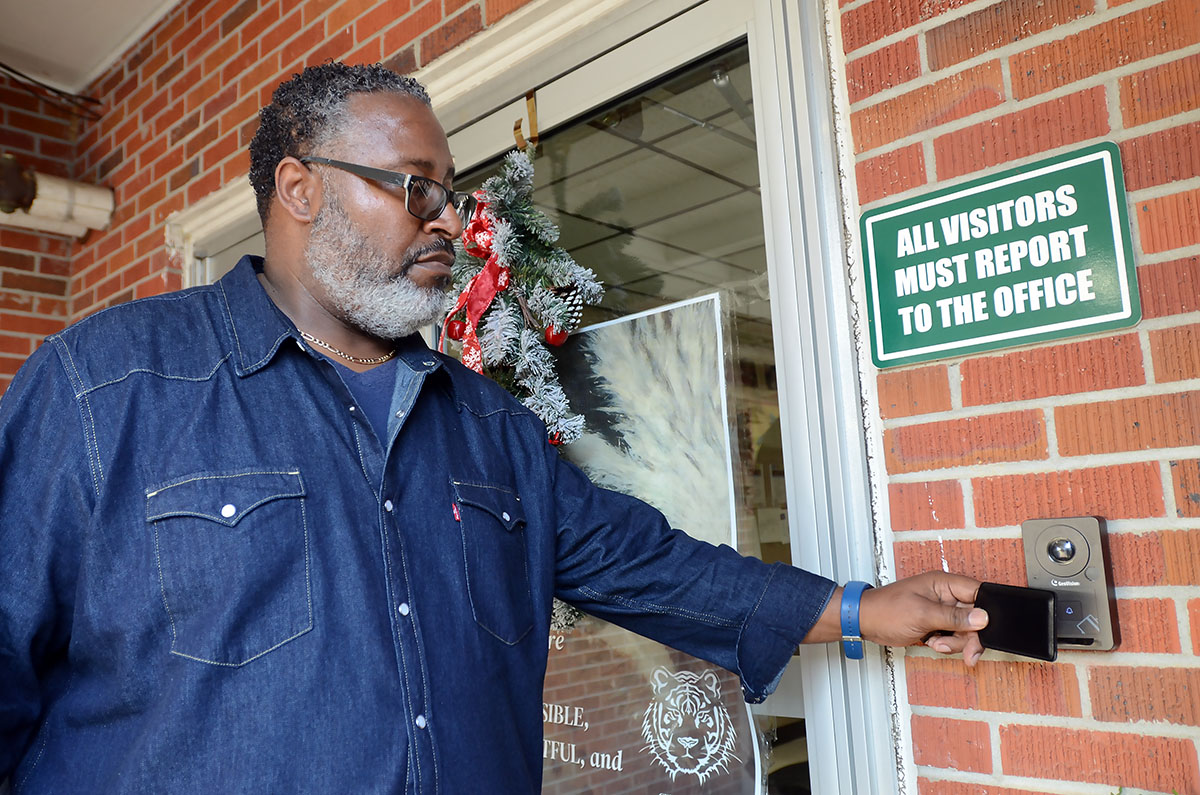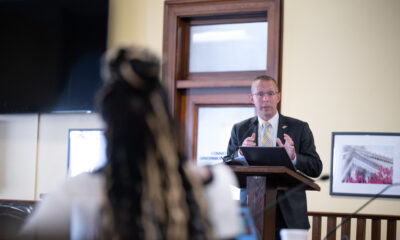Mississippi Today
Bill to arm school employees raises concerns about liability

Bill to arm school employees raises concerns about liability
Some school districts in Mississippi are worried about the financial and legal ramifications of a bill which would allow them to arm employees as a school safety measure.
Senate Bill 2079 would create a “School Safety Guardian Program,” an optional program that would authorize trained district employees to respond to school shootings. If a district chooses to participate and nominates a school employee (who must have an enhanced concealed carry permit), the employee would participate in a training course from the Department of Public Safety and undergo multiple screenings before being dubbed a “School Guardian.” A House addition to the bill would allow either school employees or outside people to serve in this role, a provision Public Safety Commissioner Sean Tindell said he would prefer removed.
The proposed program, largely borne of concern regarding the rising rate of school shootings nationally, is intended to provide school districts with another way to increase school security. The risks associated with the program, including accidents related to carrying a gun and potential increases in insurance costs will likely prevent most districts from participating, though some districts have already expressed interest.
Marcus Burger of Ross and Yerger, a local insurance agency, said one insurance carrier has already expressed to him it does not plan to cover any liability related to the program. He doesn’t expect to see mainstream insurance carriers offer policies until the program has been around for a few years to give carriers a better understanding of the risks. When Kansas passed a law in 2013 to allow armed teachers (with no special training) on school campuses, the state’s primary liability insurance carrier declined to cover districts with armed employees. Burger added some higher-risk carriers may offer coverage, potentially for a higher premium.
Enhanced concealed carry permit holders are already allowed to bring guns onto school campuses, but, a Mississippi Department of Education official told Mississippi Today in December, after the policy garnered attention last summer, that school districts had concerns about the added liability of more guns on campuses and the impact it would have on their insurance costs.
READ MORE: How is Mississippi responding to the threat of school shootings?
School shootings have been on the rise nationally over the last decade, with 93 incidents in the 2020-2021 school year. Mississippi’s most notable school shooting occurred in 1997 at Pearl High School. More broadly, the Clarion Ledger reported there have been at least 25 incidents involving guns and students in Mississippi over the last 40 years.
Twenty-eight states already allow school staff to be armed in some capacity according to a RAND Corp. report, but fewer have training programs targeting active shooter response.
In Florida, where a “guardian” program was adopted after the 2018 shooting at Stoneman Douglas High School, the state added liability protections to their professional liability policy for teachers who participated in the program. When the protections were added, the Florida Department of Education asked their Legislature for $200,000 to cover the additional cost – it is unclear if they received it.
In Texas, the number of districts participating in their guardian program has risen significantly since 2018, from 303 to 445. A Texas Association of School Boards 2022 report said most districts were only allowing “commissioned peace officers,” a broader term for people with any type of law enforcement experience, as school guardians.
Jim Keith, a school board attorney whose firm represents over 20 districts across Mississippi, said some districts he works with are interested in adopting the guardian program but he does not expect it to be widespread.
Some education officials and school leaders have said school resource officers, or police officers that work in or for schools, would be preferable to the guardian program, but acknowledged this program could fill a gap for some rural or financially stressed districts that lack qualified applicants or can’t afford full-time school resource officers.
Lauderdale County School District Superintendent John-Mark Cain said his district works with the local sheriff’s office to put a school resource officer on every campus, but he knows other districts that do take advantage of state law as it currently stands to arm staff.
“The district sees (school resource officers) as the most opportune situation since we have that great partnership. However, we do understand that certain districts do not have that luxury, and those local boards will have to work with their attorney and their insurance to essentially measure that liability and that risk,” Cain said.
Research on the impacts of school resource officers has not shown them to be effective at preventing shootings and they are linked with increased suspensions and arrests, but have been effective at stopping fights.
Mississippi’s proposed program includes legal protections for the guardians from both civil and criminal liability if they are actively responding to a shooter or other safety threat. The bill specifies guardians can still be sued if they fail to carry out their official duties.
Keith said in his reading of the bill, the civil protections for guardians would also extend to the school district. Keith added he is concerned about what exactly will fall under a guardian’s official duties.
He said it needs to be clear “what those requirements are going to be to enable someone who is a guardian to make sure that they are acting within the course and scope of those duties. Because if they act outside it, then they lose their immunity, which means the school district could possibly lose its immunity.”
Tindell, whose department is overseeing the program, said that he understands this concern but does not expect guardians to have rigidly outlined duties.
“The primary duty is to protect the school from an active shooter and protect the students,” he said. “I think if they’re doing anything outside of that, that would be outside of the scope of their duties.”
Some have also expressed concern about accidents occurring with the guardian’s gun, which Rep. John Hines, D-Greenville, brought up during debate on the House floor. Rep. Nick Bain, R-Corinth, who was presenting the bill, said the school district and teacher would be liable in cases of accidents and the immunity provision in the bill would not apply.
“If a teacher accidentally discharges a firearm because the gun falls out of the holster or there’s a scuffle between students and they try to break it up and a student grabs the teacher’s weapon and somebody else that’s not involved gets shot, what’s the course (sic) of action for that?” Hines told Mississippi Today after the debate.
Hines also expressed concern about the provision of the bill that requires guardians to have their gun on their person at all times, referring to it as “overkill.”
Tindell said this provision is important so that guardians are quickly able to respond if an active shooter situation arises, but that he would also be amenable to amendments allowing for the gun to be locked up at certain times. Tindell also highlighted that the bill requires a school shooting response plan and chain of command to be created and uniformly implemented across the state.
Like Hines,school leaders are worried about the increased risk that comes with more guns on school property. James Waldington, superintendent of the Greenwood-Leflore Consolidated School District, said he worries daily about guns being brought to campus by students, shooters and school resource officers.
“Although I feel the bill is being discussed as another level of protection for our students (and) staff and I sincerely applaud that effort, to add another dimension to the educational environment where a loaded weapon is present is concerning, to say the least,” he said.
The bill has passed both houses of the Legislature with a sizable majority, and currently heads to a conference committee to work out the differences between the two versions. Sen. Angela Hill, R-Picayune, authored the bill and said the differences between the two versions are relatively minor.
It’s likely Gov. Tate Reeves will sign the bill, as he included a version of the program in his legislative budget recommendations from November of last year.
When asked about possible increases in the cost of liability insurance for districts related to this program, Hill said she was not familiar with this concern but that similar programs had been adopted in other states “and they still have liability insurance.”
Hill said she chose to author this bill because the superintendent of her district asked for it.
“Many of these campuses are rural, they’re spread out, the response time to have additional law enforcement is sometimes unacceptable,” she said. “Some school districts feel like they need more qualified people to be able to respond as a part of their security team.”
Ken Barron, superintendent of the Yazoo County School District, said the district has its own police force to provide security, but that he might be interested in adding this program on top.
“I could see this possibly being a benefit with the right parameters in place,” he said.
This article first appeared on Mississippi Today and is republished here under a Creative Commons license.
Mississippi Today
New Stage’s ‘Little Women’ musical opens aptly in Women’s History Month
Ties that bind, not lines that divide, at the heart of “Little Women” are what make Louisa May Alcott’s beloved novel such an enduring classic. More than a century and a half since its 1868 publication, the March sisters’ coming-of-age tale continues to resonate in fresh approaches, say cast and crew in a musical version opening this week at New Stage Theatre in Jackson, Mississippi.
“Little Women, The Broadway Musical” adds songs to Alcott’s story of the four distinct March sisters — traditional, lovely Meg, spirited tomboy and writer Jo, quiet and gentle Beth, and artistic, pampered Amy. They are growing into young women under the watchful eye of mother Marmee as their father serves as an Army chaplain in the Civil War. “Little Women, The Broadway Musical” performances run March 25 through April 6 at New Stage Theatre.
In a serendipitous move, the production coincides with Women’s History Month in March, and has a female director at the helm — Malaika Quarterman, in her New Stage Theatre directing debut. Logistics and scheduling preferences landed the musical in March, to catch school matinees with the American classic.
The novel has inspired myriad adaptations in film, TV, stage and opera, plus literary retellings by other authors. This musical version debuted on Broadway in 2005, with music by Jason Howland, lyrics by Mindi Dickstein and book (script) by Allan Knee.
“The music in this show brings out the heart of the characters in a way that a movie or a straight play, or even the book, can’t do,” said Cameron Vipperman, whose play-within-a-play role helps illustrate the writer Jo’s growth in the story. She read the book at age 10, and now embraces how the musical dramatizes, speeds up and reconstructs the timeline for more interest and engagement.
“What a great way to introduce kids that haven’t read the book,” director Quarterman said, hitting the highlights and sending them to the pages for a deeper dive on characters they fell in love with over the two-and-a-half-hour run time.

Joy, familial warmth, love, courage, loss, grief and resilience are all threads in a story that has captivated generations and continues to find new audiences and fresh acclaim (the 2019 film adaptation by Greta Gerwig earned six Academy Award nominations).
In current contentious times, when diversity, equity and inclusion programs are being ripped out or rolled back, the poignant, women-centered narrative maintains a power to reach deep and unite.
“Stories where females support each other, instead of rip each other apart to get to the finish line — which would be the goal of getting the man or something — are very few and far between sometimes,” Quarterman said. “It’s so special because it was written so long ago, with the writer being such a strong dreamer, and dreaming big for women.
“For us to actualize it, where a female artistic producer chooses this show and believes in a brand new female director and then this person gets to empower these great, local, awesome artists — It’s just really been special to see this story and its impact ripple through generations of dreamers.” For Quarterman, a 14-year drama teacher with Jackson Public Schools active in community theater and professional regional theater, “To be able to tell this story here, for New Stage, is pretty epic for me.”
Alcott’s story is often a touchstone for young girls, and this cast of grown women finds much in the source material that they still hold dear, and that resonates in new ways.

“I relate to Jo more than any other fictional character that exists,” Kristina Swearingen said of her character, the central figure Jo March. “At different parts of my life, I have related to her in different parts of hers.”
The Alabama native, more recently of New York, recalled her “energetic, crazy, running-around-having-a-grand-old-time” youth in high school and college, then a career-driven purpose that led her, like Jo, to move to New York.
Swearingen first did this show in college, before the loss of grandparents and a major move. Now, “I know what it’s like to grieve the loss of a loved one, and to live so far away from home, and wanting to go home and be with your family but also wanting to be in a place where your career can take off. .. It hits a lot closer to home.”
As one of four sisters in real life, Frannie Dean of Flora draws on a wealth of memories in playing Beth — including her own family position as next to the youngest of the girls. She and siblings read the story together in their homeschooled childhood, assigning each other roles.

“Omigosh, this is my life,” she said, chuckling. “We would play pretend all day. … ‘Little Women’ is really sweet in that aspect, to really be able to carry my own experience with my family and bring it into the show. … It’s timeless in its nature, its warmth and what it brings to people.”
Jennifer Smith of Clinton, as March family matriarch Marmee, found her way in through a song. First introduced to Marmee’s song “Here Alone” a decade ago when starting voice lessons as an adult, she made it her own. “It became an audition piece for me. It became a dream role for me. It’s been pivotal in opening up doors for me.”
She relishes aging into this role, countering a common fear of women in the entertainment field that they may “age out” of desirable parts. “It’s just a full-circle moment for me, and I’m grateful for it.”

Quarterman fell in love with the 1969 film version she watched with her sister when they were little, adoring the family’s playfulness and stability. Amid teenage angst, she identified with the inevitable growth and change that came with siblings growing up and moving on. Being a mom brings a whole different lens.
“Seeing these little people in your life just growing up, being their own unique versions, all going through their own arc — it’s just fun, and I think that’s why you can stay connected” to the story at any life juncture, she said.
Cast member Slade Haney pointed out the rarity of a story set on a Northeastern homestead during the Civil War.
“You’re getting to see what it was like for the women whose husbands were away at war — how moms struggled, how sisters struggled. You had to make your own means. … I think both men and women can see themselves in these characters, in wanting to be independent like Jo, or like Amy wanting to have something of value that belongs to you and not just just feel like you’re passed over all the time, and Meg, to be valuable to someone else, and in Beth, for everyone to be happy and content and love each other,” Haney said.
New Stage Theatre Artistic Director Francine Reynolds drew attention, too, to the rarity of an American classic for the stage offering an abundance of women’s roles that can showcase Jackson metro’s talent pool. “We just always have so many great women,” she said, and classics — “To Kill a Mockingbird” and “Death of a Salesman,” for instance — often offer fewer parts for them, though contemporary dramas are more balanced.
Reynolds sees value in the musical’s timing and storyline. “Of course, we need to celebrate the contributions of women. This was a woman who was trying to be a writer in 1865, ’66, ’67. That’s, to me, a real trailblazing thing.
“It is important to show, this was a real person — Louisa May Alcott, personified as Jo. It’s important to hold these people up as role models for other young girls, to show that you can do this, too. You can dream your dream. You can strive to break boundaries.”
It is a key reminder of advancements that may be threatened. “We’ve made such strides,” Reynolds said, “and had so many great programs to open doors for people, that I feel like those doors are going to start closing, just because of things you are allowed to say and things you aren’t allowed.”
For tickets, $50 (discounts for seniors, students, military), visit www.newstagetheatre.com or the New Stage Theatre box office, or call 601-948-3533.
This article first appeared on Mississippi Today and is republished here under a Creative Commons license.![]()
Mississippi Today
Rolling Fork – 2 Years Later

Tracy Harden stood outside her Chuck’s Dairy Bar in Rolling Fork, teary eyed, remembering not the EF-4 tornado that nearly wiped the town off the map two years before. Instead, she became emotional, “even after all this time,” she said, thinking of the overwhelming help people who’d come from all over selflessly offered.
“We’re back now, she said, smiling. “People have been so kind.”


“I stepped out of that cooler two years ago and saw everything, and I mean, everything was just… gone,” she said, her voice trailing off. “My God, I thought. What are we going to do now? But people came and were so giving. It’s remarkable, and such a blessing.”

“And to have another one come on almost the exact date the first came,” she said, shaking her head. “I got word from these young storm chasers I’d met. He told me they were tracking this one, and it looked like it was coming straight for us in Rolling Fork.”
“I got up and went outside.”
“And there it was!”
“I cannot tell you what went through me seeing that tornado form in the sky.”
The tornado that touched down in Rolling Fork last Sunday did minimal damage and claimed no lives.
Horns honk as people travel along U.S. 61. Harden smiles and waves.
She heads back into her restaurant after chatting with friends to resume grill duties as people, some local, some just passing through town, line up for burgers and ice cream treats.


Rolling Fork is mending, slowly. Although there is evidence of some rebuilding such as new homes under construction, many buildings like the library and post office remain boarded up and closed. A brutal reminder of that fateful evening two years ago.


















This article first appeared on Mississippi Today and is republished here under a Creative Commons license.![]()
Mississippi Today
Remembering Big George Foreman and a poor guy named Pedro
George Foreman, surely one of the world’s most intriguing and transformative sports figures of the 20th century, died over the weekend at the age of 76. Please indulge me a few memories.
This was back when professional boxing was in its heyday. Muhammad Ali was heavyweight champion of the world for a second time. The lower weight divisions featured such skilled champions and future champs as Alex Arugello, Roberto “Hands of Stone” Duran, Tommy “Hit Man” Hearns and Sugar Ray Leonard.
Boxing was front page news all over the globe. Indeed, Ali was said to be the most famous person in the world and had stunned the boxing world by stopping the previously undefeated Foreman in an eighth round knockout in Kinshasa, Zaire, in October of 1974. Foreman, once an Olympic gold medalist at age 19, had won his previous 40 professional fights and few had lasted past the second round. Big George, as he was known, packed a fearsome punch.
My dealings with Foreman began in January of 1977, roughly 27 months after his Ali debacle with Foreman in the middle of a boxing comeback. At the time, I was the sports editor of my hometown newspaper in Hattiesburg when the news came that Foreman was going to fight a Puerto Rican professional named Pedro Agosto in Pensacola, just three hours away.
Right away, I applied for press credentials and was rewarded with a ringside seats at the Pensacola Civic Center. I thought I was going to cover a boxing match. It turned out more like an execution.
The mismatch was evident from the pre-fight introductions. Foreman towered over the 5-foot, 11-inch Agosto. Foreman had muscles on top of muscles, Agosto not so much. When they announced Agosto weighed 205 pounds, the New York sports writer next to me wise-cracked, “Yeah, well what is he going to weigh without his head?”
It looked entirely possible we might learn.
Foreman toyed with the smaller man for three rounds, almost like a full-grown German shepherd dealing with a tiny, yapping Shih Tzu. By the fourth round, Big George had tired of the yapping. With punches that landed like claps of thunder, Foreman knocked Agosto down three times. Twice, Agosto struggled to his feet after the referee counted to nine. Nearly half a century later I have no idea why Agosto got up. Nobody present– or the national TV audience – would have blamed him for playing possum. But, no, he got up the second time and stumbled over into the corner of the ring right in front of me. And that’s where he was when Foreman hit him with an evil right uppercut to the jaw that lifted the smaller man a foot off the canvas and sprayed me and everyone in the vicinity with Agosto’s blood, sweat and snot – thankfully, no brains. That’s when the ref ended it.
It remains the only time in my sports writing career I had to buy a T-shirt at the event to wear home.
So, now, let’s move ahead 18 years to July of 1995. Foreman had long since completed his comeback by winning back the heavyweight championship. He had become a preacher. He also had become a pitch man for a an indoor grill that bore his name and would sell more than 100 million units. He was a millionaire many times over. He made far more for hawking that grill than he ever made as a fighter. He had become a beloved figure, known for his warm smile and his soothing voice. And now he was coming to Jackson to sign his biography. His publishing company called my office to ask if I’d like an interview. I said I surely would.
One day at the office, I answered my phone and the familiar voice on the other end said, “This is George Foreman and I heard you wanted to talk to me.”
I told him I wanted to talk to him about his book but first I wanted to tell him he owed me a shirt.
“A shirt?” he said. “How’s that?”
I asked him if remembered a guy named Pedro Agosto. He said he did. “Man, I really hit that poor guy,” he said.
I thought you had killed him, I said, and I then told him about all the blood and snot that ruined my shirt.
“Man, I’m sorry about that,” he said. “I’d never hit a guy like that now. I was an angry, angry man back then.”
We had a nice conversation. He told me about finding his Lord. He told me about his 12 children, including five boys, all of whom he named George.
I asked him why he would give five boys the same name.
“I never met my father until late in his life,” Big George told me. “My father never gave me nothing. So I decided I was going to give all my boys something to remember me by. I gave them all my name.”
Yes, and he named one of his girls Georgette.
We did get around to talking about his book, and you will not be surprised by its title: “By George.”
This article first appeared on Mississippi Today and is republished here under a Creative Commons license.![]()
://mississippitoday.org”>Mississippi Today.
-

 Local News Video3 days ago
Local News Video3 days agoLocal pharmacists advocating for passage of bill limiting control of pharmacy benefit managers
-

 News from the South - Texas News Feed6 days ago
News from the South - Texas News Feed6 days agoI-35 crash: Witness confronts driver who caused deadly crash
-

 News from the South - Florida News Feed4 days ago
News from the South - Florida News Feed4 days agoDeSantis returns millions in federal funds as Florida cities receive DOGE letters
-

 Mississippi Today6 days ago
Mississippi Today6 days agoOn this day in 1956
-

 News from the South - Florida News Feed4 days ago
News from the South - Florida News Feed4 days agoFlorida boy 'tortured' by mom, her boyfriend dies weeks after hospitalization, police say
-

 Mississippi Today7 days ago
Mississippi Today7 days agoDomestic violence deaths reflect families’ loss and grief
-

 Mississippi News Video6 days ago
Mississippi News Video6 days agoMississippi income tax elimination bill awaits governor’s approval
-

 News from the South - West Virginia News Feed7 days ago
News from the South - West Virginia News Feed7 days agoWV lawmakers don’t want foster kids living in hotels, campgrounds; DoHS pushes back on their plan












































